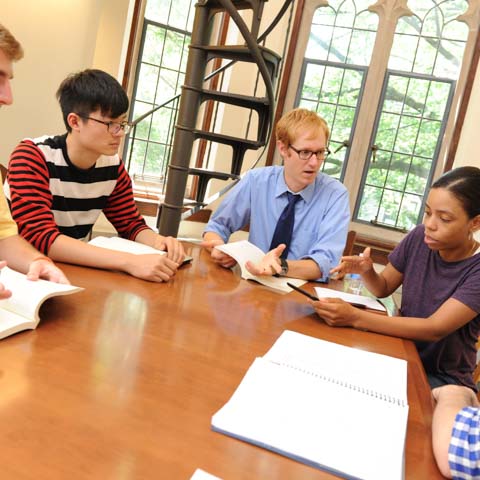Comparative Literature
Degree Options: Major, Minor
Locations: Lincoln Center, Rose Hill
Visit the Comparative Literature Program
Cross cultures, transcend disciplines, and bridge linguistic divides.
 Our comparative literature major explores literatures and cultures across eras, languages and media. As a comparative literature major at Fordham, you will join a vibrant community of international faculty and students with interests in literature, art and music, film and media, technology and the sciences, history, philosophy and theology. You will gain rigorous training in reading, writing, speaking, and thinking critically in multiple languages and literary traditions. You will learn the tools of more than one discipline, which will enable you to reflect upon differences and commonalities, and conflicts and exchanges among cultures throughout the world.
Our comparative literature major explores literatures and cultures across eras, languages and media. As a comparative literature major at Fordham, you will join a vibrant community of international faculty and students with interests in literature, art and music, film and media, technology and the sciences, history, philosophy and theology. You will gain rigorous training in reading, writing, speaking, and thinking critically in multiple languages and literary traditions. You will learn the tools of more than one discipline, which will enable you to reflect upon differences and commonalities, and conflicts and exchanges among cultures throughout the world.
Of course, you’ll learn more than comparative literature here. You’ll also study philosophy, theology, economics, mathematics, languages, science, and the performing arts through Fordham’s common core curriculum, the centerpiece of our liberal arts education.
-
Consider investigating the interactions of two or more Western or non-Western traditions; the literary and cultural expressions of diaspora communities and questions of identity and diversity; the connections between literature and other modes of understanding nature, reality and human experiences, or between literature and other modes of human communication; the interactions between verbal expressions and non-verbal experiences; or the interconnectedness among different modes of critical thinking on art, literature, nature and society. As a comparative literature major, you will take nine courses relevant to your interests and area of investigation, write a senior thesis, and participate in the senior project roundtable.
Studying abroad for a summer, a semester or a year will give you a radically different perspective on yourself and the world. Explore this option through Fordham’s International and Study Abroad Program.
You are welcome to join the editorial staff of Bricolage, a multi-disciplinary and multi-lingual journal on poetry, narrative, theater, film, the arts, culture, and theory that we publish every year.
We sponsor conferences, roundtables, lectures, and film series throughout the year. Particularly successful events are the Senior Project Roundtable, where graduating seniors present their final projects in conversation with faculty and students from multiple disciplines, and the Comparative Literature May Colloquium, a roundtable discussion on topics in comparative and interdisciplinary studies with speakers from inside and outside Fordham.
-
Old/New Worlds
Women and Independence in Africa
Theories of Comparative Literature
World Cinema Masterpieces
The City in Literature and Art
Narrating Childhood
Medicine and Literature in the Ancient Régime
Comparative Studies in Revolution
Literature, Film, and Development
Novels of Ideas: 19th Century
Representing Art in Literature
Reading the Indian Ocean World -
With an advanced mastery in one or more classical and modern foreign languages, literatures and cultures, and an intense training in critical thinking, effective written expression, and research, you will be well prepared to work in law, international relations, publishing, journalism, teaching, and business, or to continue your education and earn an advanced degree in Comparative Literature, English, classical languages and civilizations, or modern foreign languages and literatures. Recent graduates of our program have received Fulbright Teaching Fellowships in Malaysia and Vietnam. Some have pursued individual artistic careers, and careers in non-profit organizations or in the financial sector.
Learn More About the Comparative Literature Degree
E-mail us
- General: [email protected]
- International: [email protected]
- Transfer Students: [email protected]
- Financial Aid: [email protected]
- Find your admission counselor
- Information for counselors
Visit and Chat with us
- Schedule a Visit: [email protected]
- Chat with our student ambassadors
Connect with us on social media
- Follow us on Instagram
Request Information